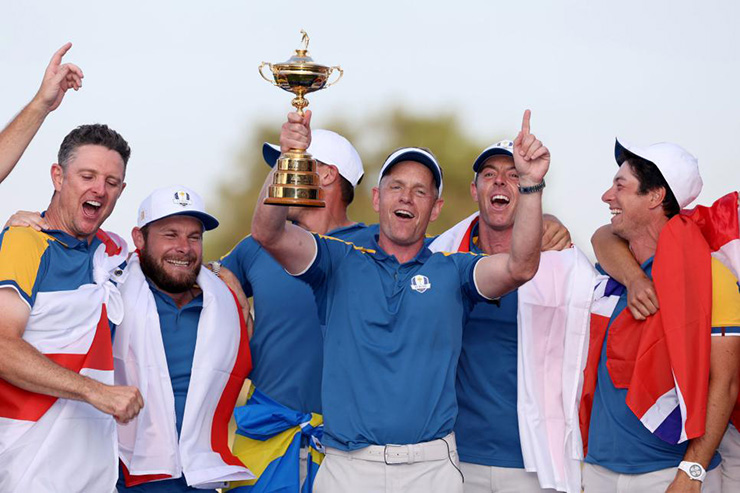It is quite the contrast. As reports surface that the PGA of America is mulling plans to compensate the 12 members of the next American Ryder Cup side as much as $400,000 for their participation at Bethpage Black next September in the biennial match with Europe, the message from those likely to be part of the opposing team could hardly be more different.
One by one, in the wake of their opening rounds at the season-ending DP World Tour Championship, leading European players lined up to verbalize their own attitudes regarding playing for pay or playing for pride. And it didn’t take long for a comment theme to emerge. Which is no surprise. One of the biggest assets owned by the most recent Old World squads has been their adherence to a singular and collective cause.
As ever though, the most articulate explanation of the European’s attitude came from Rory McIlroy. Speaking minutes after he completed a five-under-par 67 that has him tied for the lead with Tyrrell Hatton, the Northern Irishman was vehement that, no matter what was going on across the Atlantic, nothing would change and nothing would be paid to the European players at Bethpage Black next September.
“I personally would pay for the privilege to play on the Ryder Cup,” he said. “I’ve talked about this a lot. The two purest forms of competition in our game right now are the Ryder Cup and the Olympics. Both have purity because no money is involved. I don’t want to say being paid would taint the match, but it would give it a different feel. What we’ve done a really good job of is being this really cohesive group over the past decade. We wouldn’t want anything to change that.”
Beyond history and tradition, however, McIlroy says there’s a practical economic reason as well why he and other European players are willing to bypass payments: the DP World Tour needs the money more than the players.
“I get the argument that the talent should be or could be getting paid,” he says. “It was a discussion that was happening in Rome. I can see the other side of the argument. The Ryder Cup does create a lot of revenue. It is probably one of the top-five sporting events in the world. But the Ryder Cup is so much more than that, especially to the Europeans and to our tour. We’ve all had a conversation with [European captain] Luke [Donald] over the past few weeks. The consensus is that $5 million or whatever paid to the team would be better spent elsewhere on the DP World Tour—even to support the Challenge Tour.”
Others were quick to back-up McIlroy’s well-reasoned assertion, adding a certain level of disinterest in whatever the Americans decide to do.
“The Ryder Cup is a privilege and it’s what I work for,” said McIlroy’s fellow-Irishman, Shane Lowry. “It’s what I’ve worked for for the last 10, 15 years. And I’ve been fortunate to do two of them. Both have been great experiences, and both have built my brand. I love the Ryder Cup, and I just want to be involved. I don’t care whether I get paid or not.”
Hatton was another quick to shoot down the hint of financial gain when it comes to his own participation in the Ryder Cup. While some may label his appeal against the fines and suspension that came with his departure to LIV Golf as cynical manipulation of the system, there is no doubt that the motivation is clear on why he wants to play in the next Ryder Cup.
“I’ve never thought about being paid to play,” he shrugged. “It’s such an honour to be a part of the 12 that play. So it’s not really a thought process for me. As for the U.S. lads, it’s up to them. If it ends up being that the U.S. team are being paid to play, I wouldn’t say it would change the mindset of a European team. We’d still go out there and try our best to win a point and retain the Ryder Cup. They are the most amazing weeks of our lives, the pinnacle of golf. That shows in how everyone kind of speaks about it, certainly from our side. So it doesn’t bother me what the Americans end up doing.”
Tommy Fleetwood repeated McIlroy’s assertion that he would “probably” be happy to pay to play, never mind receive any remuneration for doing so.
“Honestly, it’s not something I would worry about,” said the Englishman. “Pay me nothing or pay me ten million to play in the Ryder Cup, I’m still going to play it. I’ve genuinely never thought of getting paid to play. I’ve never really thought it was a thing. So I’m not really going to worry about it now. It’s likely we’ll still have the same system as we’ve had until now. And we’ll still play for the same reasons that we’ve always played.”
Main Image: Richard Heathcote









